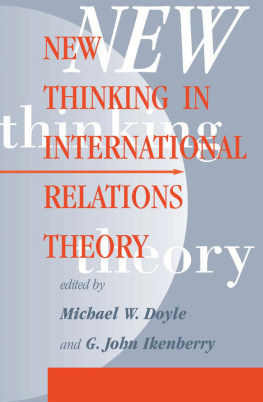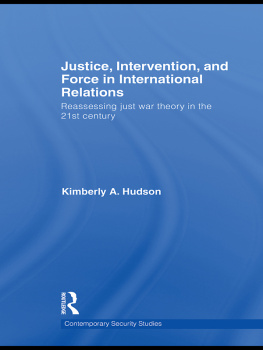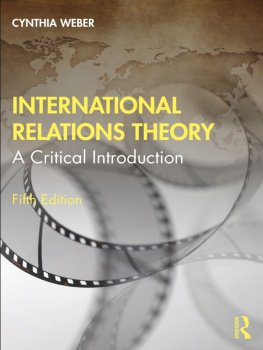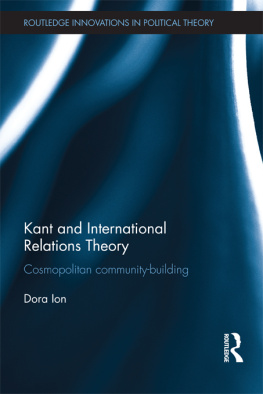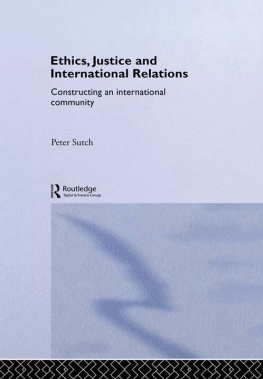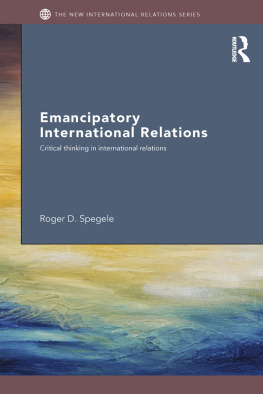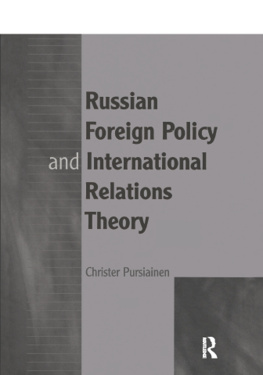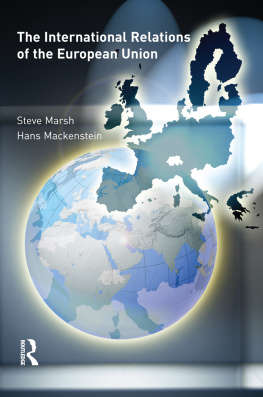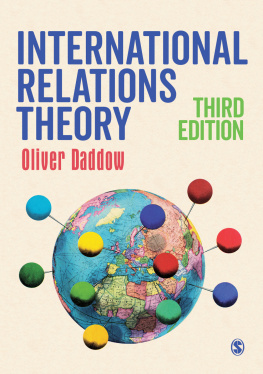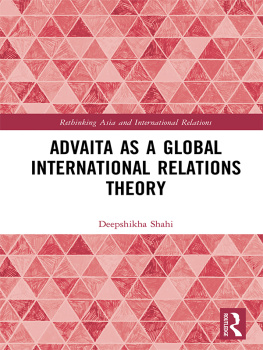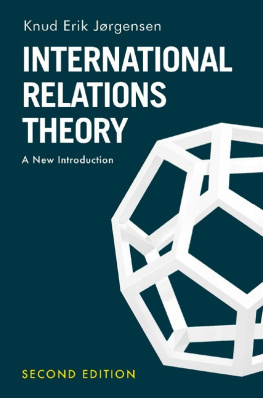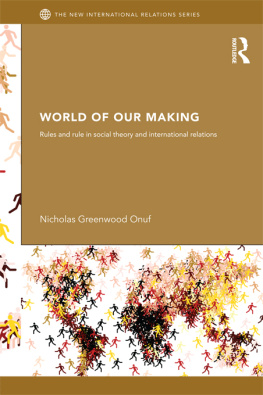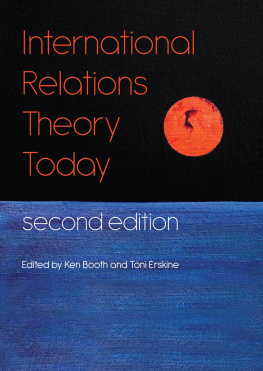NEW THINKING IN INTERNATIONAL RELATIONS THEORY
New Thinking in International Relations Theory
Edited by
Michael W. Doyle
Princeton University
and
G. John Ikenberry
University of Pennsylvania
First published 1997 by Westview Press
Published 2018 by Routledge
711 Third Avenue, New York, NY 10017, USA
2 Park Square, Milton Park, Abingdon, Oxon OX14 4RN
Routledge is an imprint of the Taylor & Francis Group, an informa business
Copyright 1997 Taylor & Francis
All rights reserved. No part of this book may be reprinted or reproduced or utilised in any form or by any electronic, mechanical, or other means, now known or hereafter invented, including photocopying and recording, or in any information storage or retrieval system, without permission in writing from the publishers.
Notice:
Product or corporate names may be trademarks or registered trademarks, and are used only for identification and explanation without intent to infringe.
Library of Congress Cataloging-in-Publication Data
New thinking in international relations theory / edited by Michael W. Doyle and G. John Ikenberry.
p. cm.
Includes bibliographical references and index.
ISBN 0-8133-9967-X (hc).ISBN 0-8133-9966-1 (pbk.)
1. International relations. I. Doyle, Michael W. II. Ikenberry, G. John.
JZ1305.N49 1997
327'.09'049dc21
97-15796
CIP
ISBN 13: 978-0-8133-9966-9 (pbk)
Publisher's Note
The publisher has gone to great lengths to ensure the quality of this book but points out that some imperfections from the original may be apparent.
Contents
, Michael W. Doyle and G. John Ikenberry
, Miles Kahler
, James Der Derian
, Jean Bethke Elshtain
, Daniel Deudney
, James DeNardo
, Joseph M. Grieco
, Matthew Evangelista
, Steven Weber
, G. John Ikenberry and Michael W. Doyle
Guide
Trotsky once remarked of his own era, "it is a curse to live in interesting times." For those who study international politics, we surely live in such times. The Soviet Union has collapsed, the Cold War has ended, some states in what was once called the Second (Soviet bloc) and Third Worlds (developing countries) are "failing," democratization is changing the face of world politics, the United Nations has emerged as a significant actorand so have a host of nongovernmental organizationswhile publics in the industrial democracies appear to be tempted by a turn inward toward isolationism.
Although dramatic global change is perhaps a curse to some old theories and conventional wisdoms, it is also an opportunity. This volume brings together provocative essays by scholars who, taken together, represent a wide range of working theoretical traditions in international relations scholarship. Moreover, our contributors reflect on how their theoretical orientations come to grips with contemporary global change. Their views range over changes in the structure of the international system, the identity and interests of the major actors, the effects of recent developments in military, industrial, and communications technology, strategies of foreign policy, and perceptions of the fundamental visions, goals, and parameters of world politics.
The essays comprise a showcase of the currently diverse theoretical agendas in the field. But the essays are also united in their attention to theoretical analysis that bears on the issue of change in global politics. Together they reflect important strands of "new thinking" in international relations theory. We, the editors, chose contributors who are interested in work currently under way outside of the mainstream of international theory, such as feminist and postmodernist theory, as well as authors who are developing theoretical advances within traditional realms, such as various international or domestic structural theories. We have selected authors and categories according to how they conceptualize the task of international political analysis, from formal modeling to discursive soliloquy, and how they categorize the important sources of change, whether they derive from the systemic interaction of states or the output of domestic politics, from ideas or material forces. We begin with the end of the Cold War, how publics interpret change, and how the classic tradition of international theoryrealism, liberalism and socialismdefines change. The classical approach is pluralistican approach that the volume taken as a whole illustrates.
We wish to thank Peter B. Lewis, who generously provided the funding that sustained the lecture series from which this volume grew. We also want to express our gratitude to Henry Bienen and John Waterbury, who, as directors of the Center of International Studies at Princeton University, offered wise counsel and material support. Peter Furia and Chandra Sriram ably assisted us and made valuable suggestions for revising some of the chapters. Philomena Fischer patiently helped us manage the process and kept track of the various drafts.
Michael W. Doyle
G. John Ikenberry
1
Introduction: The End of the Cold War, the Classical Tradition, and International Change
MICHAEL W. DOYLE AND G. JOHN IKENBERRY
In the late 1980s, as the Cold War began to thaw and then melt, politicians, pundits, and scholars disputed among ourselves what the changes meant. For some observers of the international scene the long-frozen war was ending at last. For others it was entering an even more dangerous, because more ambiguous, phase. Change itself was not new, but in 1979 the collapse of the brief dtente of the 1970s seemed to confirm a bedrock enmity between the United States and its "free world" allies on the one side and the Soviet Union and its communist allies on the other. Then in the late 1980s that fierce, refrozen enmity thawed into protestations of personal friendship between President Ronald Reagan and President Mikhail Gorbachev, into public and official acts of mutual sympathy for the victims of natural disasters in Armenia and of international terrorism in the skies over Britain, and into negotiated accords to stem the arms race. That there was change was clear, but what was changing and what remained the same, whether the change was to be welcomed or doubted, and what should be done in response to either assumption was not so clear and shaped the policy debate both in the West and in the Soviet Union. In the course of the debate the participants delved further and further into interpretations of what constitutes international amity, enmity, respect, and fear. From there analysts turned to questions of what values, institutions, and interests determine which state is a friend and which an enemy. And thus, usually implicitly rather than explicitly, they practiced international theory.
In order to understand international politics we need international theory. In this chapter, we would like to show that international theory can be useful in accounting for international change. We begin with the public debate over the end of the Cold War, the most significant international change of our decade. We then explore a classical approach to international theory that draws on the political theories of international politics, one that revives the contributions of classical political theorists and understands international relations as world politics. This, after all, is where international theory began. We begin here not just because it is a waste for any field to reinvent the wheel and because we should understand the assumptions on which the field was built but also because the classical theorists invented "wheels" whose importance we have unduly neglected. We conclude with a brief guide to how the contributors to this volume explore new paths in international theory.


